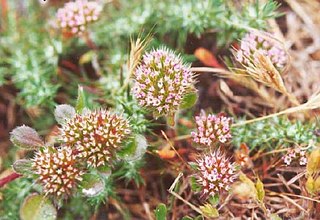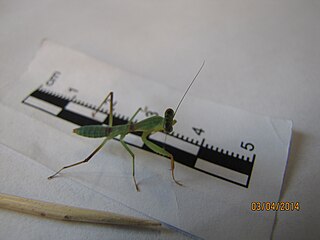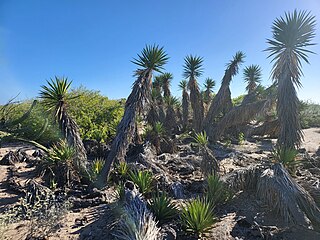
Austromuellera is a genus of only two known species of medium-sized trees, constituting part of the plant family Proteaceae. They are both endemic to three restricted areas of the wet tropics rainforests of north-eastern Queensland, Australia. The genus was named in 1930 in honour of Ferdinand von Mueller by Cyril T. White. They lie within the tribe Banksieae within the family Proteaceae, their closest relatives the genera Musgravea and Banksia.

Achatinella valida is an extinct species of air-breathing land snail, a terrestrial pulmonate gastropod mollusk in the family Achatinellidae. This species was endemic to Oʻahu, Hawaiʻi.

Chorizanthe valida is a rare species of flowering plant in the buckwheat family known by the common name Sonoma spineflower. It is endemic to West Marin, Marin County, California, where it is known from only one remaining natural population at Point Reyes National Seashore. It was thought to be extinct until 1980 when the Point Reyes population was discovered.

Rhombodera valida is a species of praying mantises in the family Mantidae, found in Indomalaya.
Planchonia valida grows as a tree up to 50 metres (160 ft) tall, with a trunk diameter of up to 2 metres. The bark is grey brown. The flowers are green. The tree grows in a variety of habitats from sea level to 1,000 metres (3,300 ft) altitude. P. valida is found in the Andaman and Nicobar Islands, Malaysia and Indonesia.

Yucca valida is a plant species in the family Asparagaceae, native to the Mexican states of Baja California, Baja California Sur, Sonora, and Sinaloa. The common name is datilillo.

Acropora valida is a species of acroporid coral found in the Red Sea, the Gulf of Aden, the southwestern, northwestern and northern Indian Ocean, the Persian Gulf, the central Indo-Pacific, Australia, southeast Asia, Japan, the East China Sea, the oceanic western, central and far eastern Pacific Ocean, the northwestern Hawaiian Islands and Johnston Atoll. It occurs in tropical shallow reefs in a variety of reef habitats, at depths of 1 to 15 metres.
Dystasia is a genus of longhorn beetles of the subfamily Lamiinae, containing the following species:
Dystasia javanica is a species of beetle in the family Cerambycidae. It was described by Stephan von Breuning in 1938.
Dystasia proxima is a species of beetle in the family Cerambycidae. It was described by Stephan von Breuning in 1938. It is known from Borneo.
Dystasia siamensis is a species of beetle in the family Cerambycidae. It was described by Stephan von Breuning in 1938.
Dystasia subcristata is a species of beetle in the family Cerambycidae. It was described by Stephan von Breuning in 1938.
Dystasia bella is a species of beetle in the family Cerambycidae. It was described by Stephan von Breuning in 1940.
Dystasia chassoti is a species of beetle in the family Cerambycidae. It was described by Stephan von Breuning in 1973.
Dystasia laterivitta is a species of beetle in the family Cerambycidae. It was described by Stephan von Breuning in 1942.
Dystasia semicana is a species of beetle in the family Cerambycidae. It was described by Francis Polkinghorne Pascoe in 1864.
Dystasia cristata is a species of beetle in the family Cerambycidae. It was described by Warren Samuel Fisher in 1933.
Dystasia sibuyana is a species of beetle in the family Cerambycidae. It was described by Per Olof Christopher Aurivillius in 1927. It is known from Malaysia, the Philippines and Borneo.
Dystasia tonkinea is a species of beetle in the family Cerambycidae. It was described by Maurice Pic in 1930.
Dystasia variegata is a species of beetle in the family Cerambycidae. It was described by Warren Samuel Fisher in 1936.





